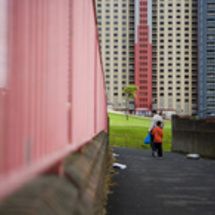
The UK Government’s contract to provide accommodation to people seeking refugee protection in Scotland will be delivered for the next seven years by the Mears Group.
After seven years of multinational security firm Serco overseeing the contract in Scotland we welcome the chance for a different provider to take a new approach and to put the rights and dignity of each individual at the heart of the service.
Scottish Refugee Council’s Policy Officer Graham O’Neill said:
“Over the last seven years we’ve seen too many examples of the impact poor quality accommodation has on people, particularly on children, pregnant women and parents. We’ve heard how people have been left in despair after being treated with a lack of dignity and respect from accommodation staff and how frightened people were after Serco locked people out of their homes.
“It is time for a new approach and in Glasgow we welcome this new chapter in supporting people seeking refugee protection.
“Providing housing to people in need is an essential public service and the rights, needs and dignity of people seeking refugee protection must be at the heart of the Mears Group’s work as they take over from Serco.
“We want to see the new housing provider work collaboratively with Glasgow City Council, sharing decision making with the council and working transparently with local services and communities.
“With these assurances in place we look forward to working alongside the Mears Group to make sure that anyone seeking refugee protection in Scotland is able to begin rebuilding their lives in safe, secure and appropriate accommodation.”
Our five key asks of the new accommodation provider:
1. Understand that providing “asylum accommodation” is delivering an essential public service
Asylum accommodation is a public service. It derives from international law on refugee protection and reception standards and the right to shelter and is part of UK law. This service should be available for all people in the asylum process, including those refused and appeal rights exhausted, up to the point of voluntary or safe return.
2. Ensure the dignity of the person is at the centre of this service
The dignity and wellbeing of the person must be placed at the centre of the design and delivery of this public service. The housing provided must recognise and meet particular needs, such as disabilities, ensuring safety for survivors of sexual violence, or that torture survivors are not forced to room-share in ways that aggravate any PTSD.
3. Support and enable people to access their rights within the asylum system
People seeking refugee protection have rights beyond housing. Access to these rights should be supported and not hindered by the service. Important entitlements include practicable access to asylum legal representation or to healthcare – such as psychological trauma services or antenatal and perinatal care for pregnant women and new mothers. All these should be built into the design and delivery of any housing arrangement.
4. Work in partnership with local services, communities and councils
The service should be based on the principle of responsibility-sharing and partnership working. The new provider must agree to make shared decisions with local councils and to work transparently with local services and communities.
5. Agree a process of property inspections with local authorities
To ensure accommodation meets the shared standards expected by local authority property inspections.
